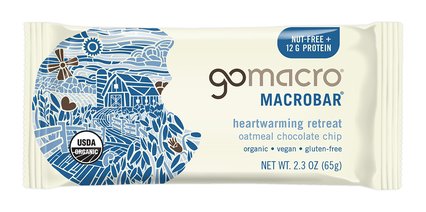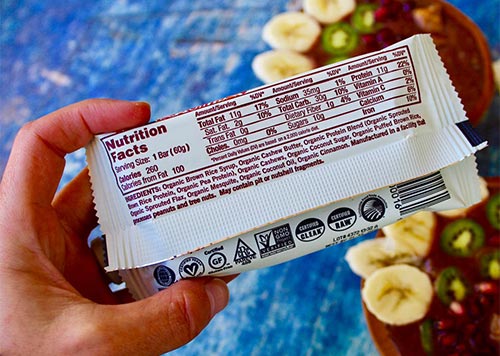What Is A GMO?
GMOs, or genetically modified organisms, have sparked widespread discussions in the food industry, prompting concerns and curiosity about their effects on our food and bodies. Genetic modification involves manipulating an organism's DNA, either by introducing new genes or modifying existing ones, to achieve desired traits or characteristics.
Much of the current scientific consensus indicates that GMOs are not inherently riskier than their conventional counterparts. However, many consumers are concerned about the unknown long-term effects of GMOs and want transparency about what goes into the foods they eat.

How Do GMOs Affect Food and Our Bodies?
When it comes to crops, genetic modifications are typically performed to introduce traits such as resistance to pests and diseases, tolerance to herbicides, or longer shelf life. For example, one type of GMO potato was genetically modified to contain a gene that can detoxify herbicides, thus protecting the potato from herbicidal treatment and allowing farmers to treat weeds without killing potato plants.
While these modifications offer potential benefits, questions have also arisen regarding their impact on human health and the environment. Many major institutions and organizations assert that no specific safety risks or health concerns can be attributed to the consumption of GMOs. However, some scientists argue that potential health risks indicated in human and animal studies warrant further research into the topic. Many consumers still have concerns about long-term food safety, corporate control of seeds, environmental effects, the impact on small farmers, and potential pesticide use associated with the crops.
Certain GMO crops do have a higher risk of herbicide contamination as they are genetically modified specifically to be able to withstand herbicidal treatment – like the aforementioned potato! This allows the crops to be sprayed with herbicides, killing unwanted weeds without killing the crops themselves. In fact, the majority of GMO soybeans are modified to be resistant to the herbicide glyphosate (marketed as Roundup), which is linked with many potential health concerns. Because of this, there are high concentrations of Roundup found on as much as 70% of GMO soybeans, which means a lot of herbicides finding their way into the environment and our food supply.
Conversely, however, some GMO crops actually require less pesticide use than their traditional counterparts, as they are genetically engineered to be biologically resistant to certain pests.
Although there is still ongoing debate around the health and environmental effects of GMOs, the potential for various negative impacts is enough to make cautious consumers think twice. If you’re opting to avoid GMOs, it’s smart to pay close attention to labels and choose USDA Certified Organic, Non-GMO Project Verified, and/or locally-grown foods whenever possible.
At GoMacro®, we believe that natural, less processed foods that are closer to the earth are healthier for our bodies, souls, and the planet. We are dedicated to transparency and only use USDA Certified Organic, Non-GMO Project Verified ingredients that are grown naturally. Our commitment to non-GMO standards aligns with our mission to offer delicious snacks with sustainably produced ingredients you can trust.
What Does A Non-GMO Diet Look Like?
A non-GMO diet looks a lot like any other diet, but with a bit of extra attention to labels and growing practices. Eating non-GMO just means avoiding anything that contains genetically modified foods! Beyond that, there is plenty of room for individual preferences and variety.
While it might sound difficult to avoid GMOs, in reality, there are only 11 GMO crops grown in the United States: soybeans, corn, canola, cotton, alfalfa, sugar beets, papaya, summer squash, potatoes, apples, and pink pineapple. GMOs make up a large percentage (greater than 90%) of some of these crops, such as soy, corn, sugar beets, and canola. However, only one type of genetically modified potato (white russet) and one type of apple (Arctic®) are currently available.
Aside from choosing organic or non-GMO produce, you should also look out for genetically modified (GM) ingredients on food labels. Some of the most common offenders are seed oils such as canola oil, soybean oil, or cottonseed oil found in foods like chips, salad dressings, sauces, fried foods, cookies, canned soups, and even some protein bars and nut butters. Refined sugar also often comes from GM sugar beets and high fructose corn syrup is often made from GM corn, so if you’re avoiding GMOs, opt for other sweeteners.
Many restaurants also use foods containing GMOs, especially oils used to cook or fry foods. If you’re concerned, you can always ask an employee or opt to cook more at home.
How Can I Find Non-GMO Snacks and Avoid GMOs In the Grocery Store?
Genetically modified foods have been widely available since the 1990s, but for years, it was difficult for consumers to clearly identify them in the grocery store. Until 2022, USDA Organic and Non-GMO Project Verified were the only labels indicating non-GMO foods – and these are voluntary, sometimes costly, programs that not all companies participate in.
Luckily, in 2020, the USDA announced that by 2022, all food companies would be required to disclose the presence of genetically modified ingredients on food packaging. These “bioengineered” or “derived from bioengineering” labels may be small and difficult to find, so look closely if you’re avoiding GMOs! Much of this labeling is found on products that contain ingredients made from corn, canola, soybeans, and sugar beets.
Navigating grocery store aisles can be overwhelming, but with these tips, you can make informed non-GMO choices:
- Check labels for “bioengineered”: As of January 2022, all foods containing GMOs must be labeled with a small seal or text that says “bioengineered,” or “derived from bioengineering.”
- Know your GMOs: Keep a list of common GMOs handy so you can reference it when you grocery shop. Certain apps can also help you identify non-GMO products at the store.
- Look for Non-GMO Project Verified: For an extra layer of reassurance, look for the “Non-GMO Project Verified” seal – North America’s most rigorous certification for avoiding GMOs.
- Look for USDA Organic Certification: USDA Organic standards forbid genetically modified ingredients, so you can be confident that products carrying the USDA Organic seal are free from GMOs.
- Ask questions: When in doubt, talk to employees at the store – or better yet, the farmer’s market – to get a better idea of how foods are grown and produced.
At GoMacro, our commitment to providing non-GMO protein and snack bars is a testament to our dedication to your health and the environment. By incorporating these practices into your shopping and dietary choices, you can make conscious choices that align with a non-GMO lifestyle. Understanding the intricacies of GMOs empowers us to make informed decisions about the food we consume, prioritizing our health and the well-being of our planet.









